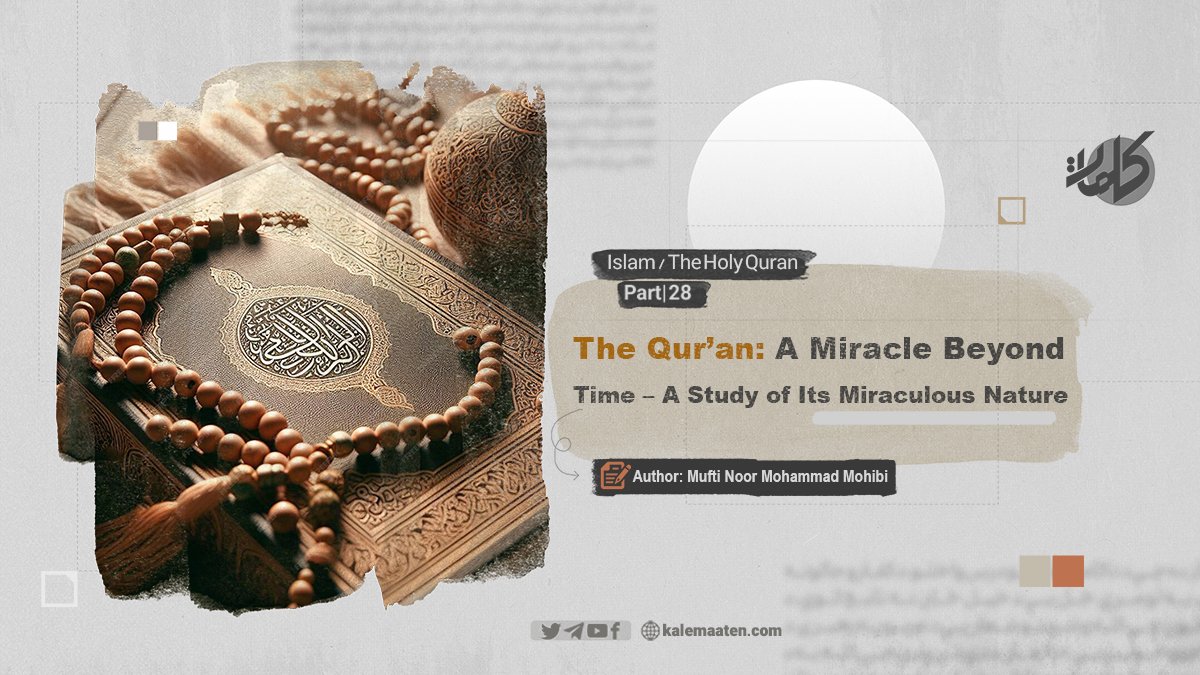
Author: Mufti Noor Mohammad Mohibi
The Quran; A Miracle Beyond Time-A Study of Its Miraculous Nature (Part 28)
The Manifestation of the Scientific Miracle of the Holy Qur’an in the Movement of the Earth and the Solar System
Among the aspects of the miraculous nature of the Holy Qur’an are its precise references to natural phenomena, expressed in concise, layered words that correspond to the capacity of human understanding in every era. One such reference—appearing in multiple verses of the Holy Qur’an with three different linguistic structures—relates to the concepts of Mashriq (East) and Maghrib (West):
-
قَالَ رَبُّ ٱلۡمَشۡرِقِ وَٱلۡمَغۡرِبِ وَمَا بَيۡنَهُمَآۖ [Ash-Shu‘arā’: 28]
Translation: “He said: ‘(He is) the Lord of the East and the West (of the planets and celestial bodies of the universe) and all that lies between them.’”
-
رَبُّ ٱلۡمَشۡرِقَيۡنِ وَرَبُّ ٱلۡمَغۡرِبَيۡنِ [Ar-Raḥmān: 17]
Translation: “(He is) the Lord of the two Easts and the Lord of the two Wests.”
-
فَلَآ أُقۡسِمُ بِرَبِّ ٱلۡمَشَٰرِقِ وَٱلۡمَغَٰرِبِ إِنَّا لَقَٰدِرُونَ [Al-Ma‘ārij: 40]
Translation: “So, I swear by the Lord of the Easts and the Wests that indeed We are Able (to do all things)!”
Three phrases, three linguistic forms (singular, dual, plural)—each with a profound allusion to a specific level of cosmic reality. This section examines the meanings of these three expressions on two levels:
-
The understanding of early generations and the human perception at the time of revelation.
-
Modern scientific interpretation based on astronomical discoveries and celestial geography.
Meaning in the Time of Qur’anic Revelation
Rabb al-Mashriq wa al-Maghrib
At a basic level, Mashriq refers to the place where the sun rises, and Maghrib to the place where it sets. In the era of Qur’anic revelation, this expression aligned perfectly with the everyday human understanding, without any apparent scientific complexity. Mashriq meant the eastward direction, and Maghrib the westward direction. Allah Almighty, as the Lord of all directions, is the Controller and Creator of the order in the sunrise and sunset.
Rabb al-Mashriqayn wa Rabb al-Maghribayn
At a more advanced level, the Holy Qur’an mentions “two Easts” and “two Wests.” At that time, this could have referred to:
-
The difference in the exact location of sunrise and sunset throughout the year (for example, between summer and winter).
-
Or to two visually distinct rising points (such as the one during the equinox and the one during the solstice).
Thus, this verse reflects a more complex understanding of the sun’s annual motion and the changing angles of sunrise and sunset—something that could be understood implicitly even in that era.
Rabb al-Mashāriq wa al-Maghārib
At this level, the Holy Qur’an speaks of the plural “Easts” and “Wests,” a comprehensive reference to the diversity and multiplicity of rising and setting points in every region, every country, every day, and even every moment. At the time of revelation, this concept could not be fully grasped, but it was partially conceivable through simple observation (like the difference in the sun’s rising position between summer and winter).
Scientific Analysis: Earth’s Motion and the Multiplicity of Sunrises and Sunsets
The Earth’s Sphericity and the Connection of East and West
From today’s scientific perspective, the Earth is spherical, and at every moment, part of it is in darkness and part in light. In other words, sunrise in one place occurs simultaneously with sunset in another. Therefore, East (Mashriq) and West (Maghrib) are interdependent concepts. When Allah Almighty says: قَالَ رَبُّ ٱلۡمَشۡرِقِ وَٱلۡمَغۡرِبِ (not “Rabb al-Mashriq wa Rabb al-Maghrib”), this symmetrical expression indicates a natural unity—sunset cannot exist without sunrise, and vice versa.
Two Easts and Two Wests: A View from Earth’s Rotation
At any given moment, the Earth is divided into two hemispheres—one in daylight, the other in darkness. Each hemisphere has its own sunrise and sunset. Thus, at any instant:
-
One East and one West exist in the first hemisphere.
-
One East and one West exist in the second hemisphere.
This astronomical fact fully aligns with the expression: رَبُّ ٱلۡمَشۡرِقَيۡنِ وَرَبُّ ٱلۡمَغۡرِبَيۡنِ. Easts and Wests: Changing Sunrise and Sunset Angles
In any location on Earth, the angle of sunrise and sunset changes daily. This phenomenon is due to:
-
The Earth’s rotation on its axis.
-
The Earth’s revolution around the sun.
In one country, the sun never rises twice from the exact same point; even within one city, the angles differ day by day. This is clearly observed in the determination of prayer times (sunrise, sunset), and the simplest example for the general public is the changing iftar time during Ramadan.
Therefore, at any moment, somewhere on Earth, the sun is rising, and somewhere else, it is setting. As a result, the Earth has countless “Easts” and “Wests,” constantly shifting. This precise scientific reality is reflected in the verse: بِرَبِّ ٱلۡمَشَٰرِقِ وَٱلۡمَغَٰرِبِ.
The Miraculous Harmony of the Qur’an with Scientific Progress
One subtle point about these three verses is that none negates or abrogates the other; rather, each expresses a truth at a specific depth.
Furthermore, the Qur’anic style indicates a relative concept of time and space. As the late Shaykh Muḥammad Mutawallī al-Sha‘rāwī رحمه الله pointed out, at any given moment, five different prayers are being performed in five different parts of the Earth: Fajr, Dhuhr, ‘Asr, Maghrib, and ‘Ishā’. This shows that by mentioning Mashriq and Maghrib in three different forms, the Qur’an simultaneously addressed the understanding of people at the time of revelation and concealed layers of meaning that would only unfold with scientific progress.
From singular to dual, and from dual to plural, the level of understanding of the audience is expanded, and each verse reveals a different part of the unified scientific system of creation. This is a clear sign of the Qur’an’s scientific miracle—
-
understandable in its era of revelation,
-
explainable in today’s age of science,
-
and carrying hidden messages for the future.
Continues…



